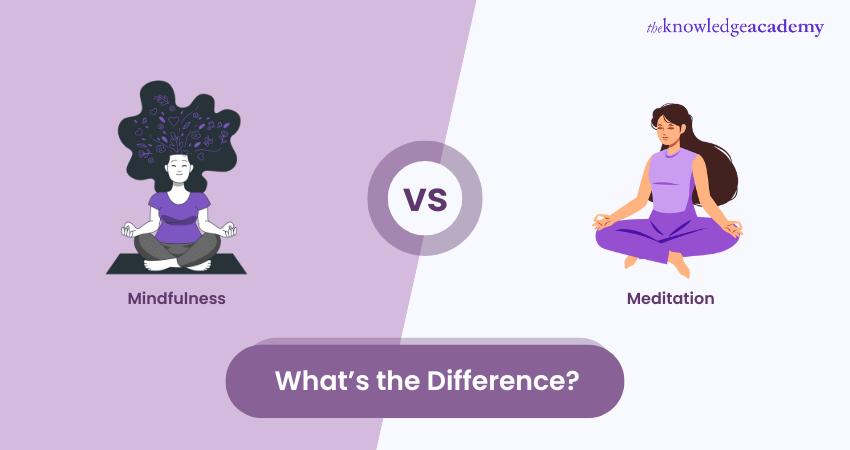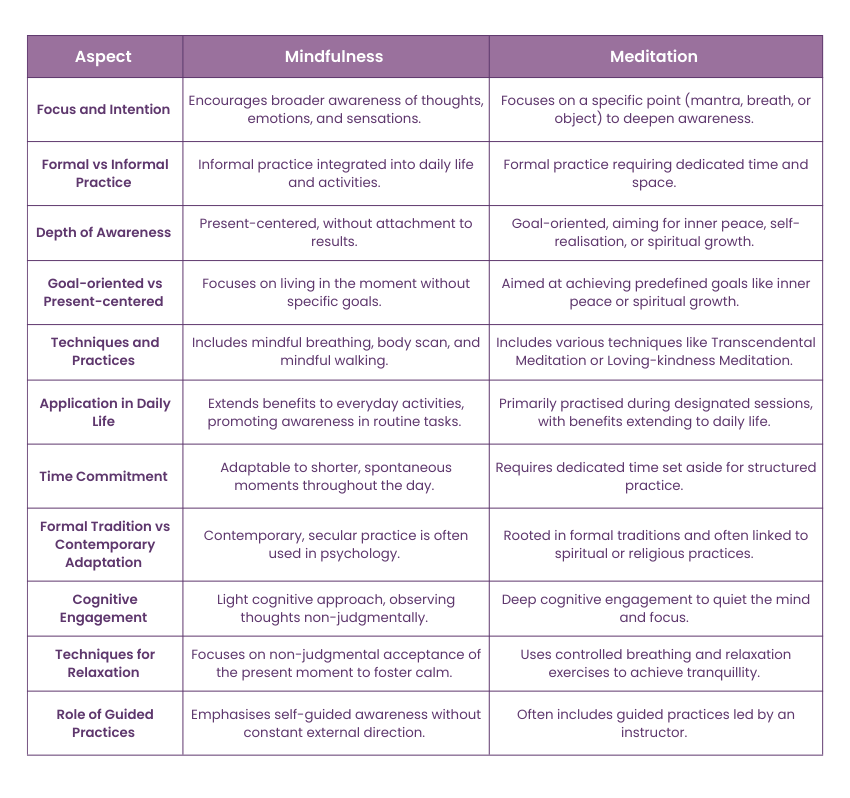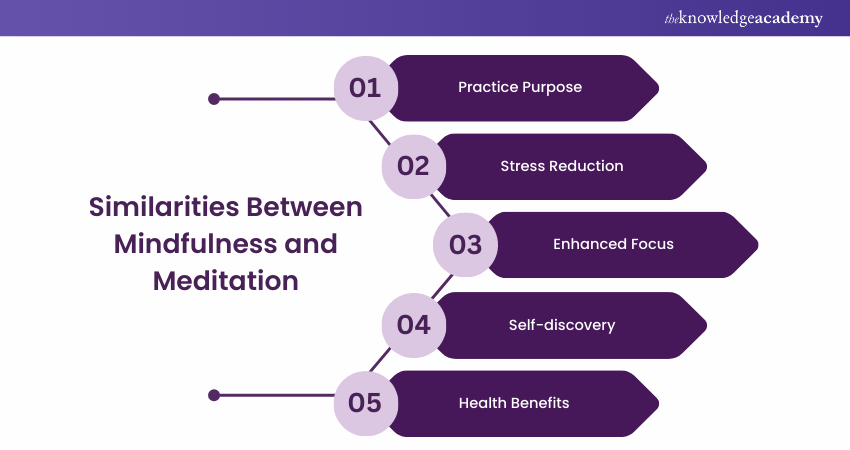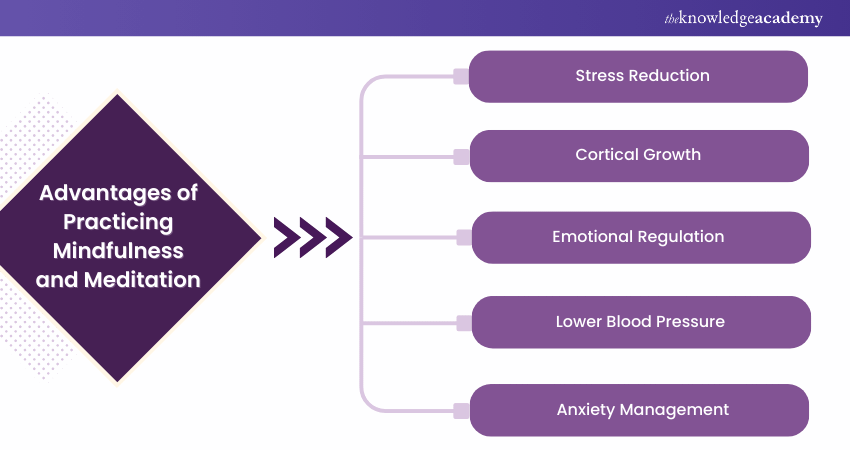We may not have the course you’re looking for. If you enquire or give us a call on 01344203999 and speak to our training experts, we may still be able to help with your training requirements.
We ensure quality, budget-alignment, and timely delivery by our expert instructors.

Imagine standing at the edge of a serene lake: Is it the mindful observation of the water’s surface that brings you peace, or is it the meditative immersion into the depths that transforms you? The journey of self-discovery often leads to the crossroads of Mindfulness vs Meditation. But do you know what truly sets them apart?
This blog delves into the essence of Mindfulness vs Meditation, unravelling the attributes that differentiate these two transformative practices. Read more to uncover the profound impacts of Mindfulness and Meditation on your well-being. It can also guide you towards a more enlightened path of personal growth.
Table of Contents
1) What is Mindfulness?
2) What is Meditation?
3) Differences Between Mindfulness and Meditation
4) Key Similarities Between Mindfulness and Meditation
5) Mindfulness vs Meditation: Key Examples
6) Health Benefits of Practicing Both
7) Conclusion
What is Mindfulness?
Mindfulness is a state of mind and practice that involves being completely present and engaged in the current moment without judgment. It encompasses a heightened awareness of one's thoughts, emotions, bodily sensations, and the surrounding environment. Rooted in Mindfulness Meditation traditions, it encourages individuals to observe their experiences non-reactively, fostering a clear and focused state of mind.
What is Meditation?
Meditation is a contemplative practice that involves training the mind to achieve a heightened state of awareness, focus, and inner tranquillity. Rooted in various spiritual and philosophical traditions, Meditation typically requires practitioners to engage in specific techniques, such as focused attention on the breath, a mantra, or an object. Its goal is to cultivate a calm and clear mental state, promoting self-discovery, emotional well-being, and, in some traditions, spiritual insight.
Dive into the Types of Meditation and discover which practice aligns with your wellness goals.
Differences Between Mindfulness and Meditation
Here, we will discuss the fundamental differences between Mindfulness and Meditation.

Focus and Intention
In Meditation, practitioners focus on a chosen point, such as a mantra, breath, or object. This intentional focus aims to cultivate a still mind, deepening awareness and often leading to specific mental states or insights.
On the other hand, Mindfulness encourages a broader awareness encompassing thoughts, emotions, and sensations without a specific focal point. The intention is to observe the present moment without judgment, fostering an open and expansive consciousness.
Formal vs. Informal Practice
Meditation is typically a formal practice that involves dedicating specific time and space for deep contemplation. It often follows structured techniques or traditions, creating a deliberate environment for inner exploration.
In contrast, Mindfulness thrives in informal, everyday settings. It invites practitioners to infuse awareness into routine activities, making it adaptable and seamlessly integrated into daily life.
Depth of Awareness
Meditation often involves setting specific goals, such as achieving inner peace, self-realisation, or spiritual growth. It is a deliberate journey with predefined objectives. These objectives include attaining inner peace, self-realisation, or spiritual growth. The Meditation process is purposeful, guiding individuals through structured practices to achieve predefined outcomes.
On the other hand, Mindfulness shifts the emphasis from goal-oriented outcomes to a present-centred approach. It encourages embracing each moment without attachment to a particular result, fostering acceptance and contentment in the current experience.
Join our Meditation Course and learn techniques to reduce stress, enhance focus, and achieve inner peace – register now!
Goal-oriented vs. Present-centered
Meditation often involves setting specific goals, such as achieving inner peace, self-realisation, or spiritual growth. It is a deliberate journey with predefined objectives. Meditation unfolds as a purposeful and intentional practice, guiding practitioners through structured techniques with the aim of attaining predefined outcomes. The depth of Meditation involves a focused pursuit of these goals, often leading to profound states of consciousness and transformative insights.
In contrast, Mindfulness shifts the emphasis from goal-oriented outcomes to a present- centered approach. It encourages embracing each moment without attachment to a particular result, fostering an attitude of acceptance and contentment in the current experience.
Techniques and Practices
Meditation encompasses various techniques, including Mindfulness Meditation, transcendental Meditation, and loving-kindness Meditation. Each technique offers a unique approach to cultivating different aspects of the mind.
On the other hand, Mindfulness includes practices like mindful breathing, body scan, and mindful walking. These practices aim to anchor awareness in the present moment, offering a range of tools adaptable to individual preferences and needs.
Application in Daily Life
The impact of Meditation is often concentrated within the dedicated practice, creating a distinct space for reflection and introspection. While the benefits of Meditation may extend to daily life, the core transformative effects are typically associated with focused Meditation sessions.
In contrast, Mindfulness extends its benefits to daily activities, encouraging practitioners to maintain heightened awareness during routine moments. This adaptability makes Mindfulness a practical and sustainable approach, seamlessly integrating mindful awareness into various aspects of daily life.
Discover the keys to a healthier life! Our Healthy Lifestyles Training offers practical tips and support for lasting change.
Time Commitment
Meditation often demands a dedicated time commitment, with practitioners setting aside specific periods for their formal practice. This time investment reflects the structured nature of Meditation sessions.
On the other hand, Mindfulness is adaptable to shorter, spontaneous intervals throughout the day. This flexibility allows individuals with busy schedules to incorporate mindful awareness into brief moments, making it accessible and feasible for diverse lifestyles.
Elevate your daily routine with our Active and Healthy Lifestyles Training - secure your spot now!
Formal Tradition vs. Contemporary Adaptation
Meditation often aligns with formal traditions rooted in diverse cultures and religions, carrying a rich historical and spiritual legacy. These formal traditions provide a structured framework for Meditation, often accompanied by rituals, specific postures, and guided techniques. Practitioners may engage in Meditation as part of spiritual or religious pursuits, aligning with centuries-old methods passed down through generations.
In contrast, Mindfulness, popularised by contemporary psychology and Mindfulness-based interventions, is often presented in a secular context. This contemporary adaptation makes Mindfulness approachable and inclusive, appealing to individuals irrespective of their cultural or religious backgrounds.
Cognitive Engagement
Meditation involves deep cognitive engagement, requiring sustained focus to quiet the mind and navigate complex mental landscapes. The challenge lies in maintaining concentration, resisting the pull of distractions, and exploring the inner consciousness. The heightened cognitive load in Meditation contributes to its transformative potential as individuals confront and transcend the habitual patterns of the mind.
In contrast, Mindfulness adopts a lighter cognitive approach. It invites practitioners to engage in non-judgmental observation of thoughts and sensations without getting deep into their content. This approach fosters a more receptive and open-minded awareness, allowing thoughts to arise and pass without undue analysis or attachment. Mindfulness encourages individuals to witness the stream of consciousness with a gentle curiosity.
Breath as a Focus
Controlled breathing is a primary focus in various Meditation practices, including Mindfulness Meditation. Practitioners intentionally regulate their breath, employing diaphragmatic breathing or rhythmic inhalation and exhalation techniques. The breath becomes a valuable tool in guiding individuals into meditative states, serving as a point of concentration to anchor the mind.
Within Mindfulness Meditation, the breath holds a significant role. While controlled breathing may be employed initially to establish focus, Mindfulness equally values the observation of the breath in its natural state. This balanced approach recognises the ebb and flow of the breath without imposing deliberate alterations. It allows individuals to transition easily between intentional focus and open awareness.
Techniques for Relaxation
Many Meditation techniques explicitly aim for relaxation, promoting a calm and tranquil state of mind. These practices often involve controlled breathing and intentional relaxation exercises, contributing to a sense of mental peace.
On the other hand, Mindfulness techniques also contribute to relaxation but tend to focus on observing and accepting the present moment, which, in turn, fosters a sense of calm. The relaxation in Mindfulness arises from non-judgmental awareness and acceptance of whatever unfolds in the present.
Role of Guided Practices
Guided Meditation practices, often led by a teacher, are common in Meditation. These sessions provide structured guidance, helping practitioners navigate their inner landscapes and deepen their meditative experiences.
In contrast, While guided practices exist in Mindfulness, the emphasis is often on self-guided awareness. Mindfulness encourages individuals to develop an independent practice, relying on their inner resources to navigate the present moment without constant external guidance.
Elevate your daily routine with our Active and Healthy Lifestyles Training - secure your spot now!
Key Similarities Between Mindfulness and Meditation
Both Mindfulness and Meditation contribute to your well-being by offering and requiring skills that are essential for personal growth. Here are five ways in which Mindfulness and Meditation align:

a) They encourage us to take ownership and be mindful of our thoughts
b) They require the honing of our abilities to focus and concentrate
c) They aid in our quest for tranquillity and bodily relaxation
d) They enhance our understanding of ourselves and our internal states
e) They are flexible practices, not bound by a mandatory daily duration
Take a break and recharge your mind! Download the Guided Meditation PDF for a peaceful, guided meditation experience.
Mindfulness vs Meditation: Key Examples
Mindfulness and Meditation are personal journeys that vary from person to person. The key is discovering the practices, environments, or companions that resonate with us and enhance our Mindfulness and Meditation journey. To spark some ideas, consider these varied approaches to Mindfulness and Meditation:
Mindfulness Examples:
a) Engage in breathing exercises to decelerate our thoughts and become present in the moment.
b) Take a stroll outside, savouring the fresh air and being mindful of our physical sensations as we move.
c) Immerse yourself in gardening, nurturing plants in the open air or within your home.
d) Savour meals slowly, paying attention to the flavours and textures with each bite.
e) Practice single-tasking by dedicating your full attention to one activity at a time.
Meditation Examples:
a) Perform loving-kindness Meditation to cultivate feelings of compassion and affection towards oneself and others.
b) Try visualisation Meditation, focusing on an image that evokes a sense of serenity.
c) Explore transcendental Meditation, possibly with a guide, using mantras as a focal point.
d) Participate in candle Meditation, centering your awareness on the dance of the candle flame.
e) Experience a sound bath Meditation, allowing the tones and vibrations of instruments to guide your focus.
f) Conduct a body scan to connect with the sensations in your body and achieve Mindfulness in the present.
Join our Mental Health And Wellbeing Training and learn how to thrive in tranquillity - sign up and start cultivating serenity today!
Health Benefits of Practicing Both
Daily practice of Mindfulness and Meditation creates numerous health benefits that enhance overall both mental and physical health. Such practices enable one to deal with stress, maintain proper psychological wellbeing and a healthy lifestyle. Below are some key health benefits:

a) Stress Reduction: Meditation also has a chief utility of decreasing stress levels through relaxation and through development of heightened awareness of the present moment.
b) Cortical Growth: Daily practice has been found to foster the development of the gray matter of the brain including those regions related to memory, learning and emotional issues.
c) Emotional Regulation: They both allow one to focus more on emotions, and therefore to have better control over responses to such things as stress.
d) Lower Blood Pressure: Prayer and meditating activities decrease blood pressure through diminishing the stress impact on the body, relating to the heart’s health.
e) Anxiety Management: Mindfulness and Meditation can make a tremendous difference in the level of anxiety that a person experiences since IT reduces the aggressive response to stress factors.
Begin your journey to calmness with our Anxiety Courses – sign up now and step into a peaceful chapter of your life!
Conclusion
The exploration of Mindfulness vs Meditation reveals two complementary yet distinct paths to cultivating a more balanced and aware mind. Remember, there is no one-size-fits-all answer in the pursuit of mental clarity and peace. It’s about finding the rhythm that resonates with your soul. Let Mindfulness and Meditation be your guides to a more centered and insightful life.
Transform your health journey! Engage in our Nutrition and Fitness Training for a holistic approach to wellness and vitality.
Frequently Asked Questions
How to Create a Simple Mindfulness or Meditation Routine?

To create a simple Mindfulness or Meditation routine, start by setting aside 5-10 minutes daily in a quiet space. Focus on your breath, observe your thoughts without judgment, or use a guided Meditation app. Gradually increase the time as you become more comfortable with the practice.
Which is Better, TM or Mindfulness?

Transcendental Meditation (TM) and Mindfulness have unique benefits. TM focuses on transcending thoughts for deep relaxation, while Mindfulness emphasises present-moment awareness. The choice depends on individual goals and preferences for stress reduction or increased awareness.
What are the Other Resources and Offers Provided by The Knowledge Academy?

The Knowledge Academy takes global learning to new heights, offering over 3,000 online courses across 490+ locations in 190+ countries. This expansive reach ensures accessibility and convenience for learners worldwide.
Alongside our diverse Online Course Catalogue, encompassing 19 major categories, we go the extra mile by providing a plethora of free educational Online Resources like News updates, Blogs, videos, webinars, and interview questions. Tailoring learning experiences further, professionals can maximise value with customisable Course Bundles of TKA.
What is the Knowledge Pass, and how does it work?

The Knowledge Academy’s Knowledge Pass, a prepaid voucher, adds another layer of flexibility, allowing course bookings over a 12-month period. Join us on a journey where education knows no bounds.
What are the Related Courses and Blogs Provided by The Knowledge Academy?

The Knowledge Academy offers various Healthy Lifestyles Training, including the Mindfulness Training, Positive Psychology Course, and Mental Capacity Training. These courses cater to different skill levels, providing comprehensive insights into Mindfulness.
Our Health & Safety Blogs cover a range of topics related to Mindfulness, offering valuable resources, best practices, and industry insights. Whether you are a beginner or looking to advance your Health and Safety knowledge, The Knowledge Academy's diverse courses and informative blogs have got you covered.
Upcoming Health & Safety Resources Batches & Dates
Date
 Life Coach Training
Life Coach Training
Fri 11th Apr 2025
Fri 13th Jun 2025
Fri 15th Aug 2025
Fri 10th Oct 2025
Fri 12th Dec 2025






 Top Rated Course
Top Rated Course



 If you wish to make any changes to your course, please
If you wish to make any changes to your course, please


